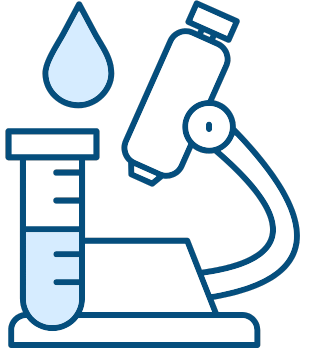Stress is our body’s natural reaction to various factors in life. Living today’s fast-paced life, constantly rushing around and trying to keep up, many people start to feel overstressed and anxious. Stress is an inevitable part of our lives today, but we often ignore its negative consequences on our physical and emotional health. When stressed, our bodies release adrenaline and cortisol, which over time can have a negative impact on the heart and brain function. Although stress is inevitable, if we are properly armed, we can easily cope with it and avoid long-term consequences. What should you know about stress? What are the symptoms? How can we manage it? These and other questions about stress and how to deal with it are answered in this article together with Drops Clinic’s specialist doctors.
What is stress?
Stress is one of our bodily functions. It is the brain’s and body’s reaction to various stimuli – stressors. What causes stress? Stressors can be external or internal factors such as environmental changes, stressful situations, conflicts, financial or emotional difficulties, problems in personal life and work, psychological illnesses.
Although stressors can vary in nature and intensity, our bodies cannot distinguish between different forms of stress and react to stressors with the same intensity. When stress is constant, it can cause lasting damage to our bodies. Chronic stress then develops.
During stress, the brain sends danger signals to our whole body. The body starts to release adrenaline and cortisol, which stimulate the body to act. However, chronic stress and high levels of cortisol can have a huge negative impact on our brain and nervous system.
Signs of stress
Stress can take many forms. Some people may experience physical tension, muscle tightness or headaches. Others may feel tired, lose their appetite or sleep poorly. The most common stress reactions are increased heart rate, muscle tension, shortness of breath, sweating and sometimes even flushing.
The main symptoms of stress can be divided into four groups:
- Physical symptoms include headaches, dizziness, muscle tension, digestive problems, rapid heartbeat, chest pain, blood pressure fluctuations, sleep problems, fatigue, weight changes, gnashing of teeth or clenched jaw, reflux, dry mouth, tinnitus, loss of libido, generalised aching and pain, sweaty palms, tremors, frequent illnesses and weakened immunity etc.
- Emotional symptoms: anxiety, fear, anger, sadness, depression, restlessness, panic, frustration, crying, pessimism, mood swings etc.
- Cognitive symptoms: concentration and concentration problems, forgetfulness, disorganisation, decision-making difficulties, indecision, chaotic thoughts, etc.
- Behavioural symptoms: increased use of cigarettes, drugs or alcohol, misuse of medicines, food problems, changes in appetite, procrastination and avoidance of responsibilities, isolation, aggressiveness, increased nervousness, nail biting, immobility or fidgeting etc.
Stress at work
Stress at work is one of the most common causes of stress. Stress at work can be caused by excessive workload, busy schedules, long working hours, deadline pressures, conflicts with colleagues or supervisors, unclear expectations or lack of recognition. Stress at work can have a negative impact on job quality, productivity and loyalty. In addition, stress at work can cause problems for the employee’s health and increase the risk of accidents at work.
How to reduce stress and tension in the work environment?
- Don’t forget to take breaks, and if you can, go out for some fresh air and sunshine during your breaks.
- Don’t forget exercises to relieve tension – exercise your eyes, take deep breaths and exercise yourself.
- Drink plenty of water. Keep a water bottle in your workplace so you always have water on hand.
- Avoid social media or other distractions that interfere with concentration.
- Initiate change in your working environment.
Stress during pregnancy
Pregnancy is a happy and important stage in life for most women. However, pregnancy is a time when a woman experiences many changes and challenges that can cause stress. Causes of stress during pregnancy can include:
- physical changes and discomfort;
- hormonal fluctuations and emotional instability;
- concerns about the baby’s health and development;
- worries about finances, work or housing;
- changes in relationships with a partner, family or friends;
- Fear of childbirth or motherhood.
Stress during pregnancy can have a negative impact on the health of both the expectant mother and the baby. Stress causes neurochemical changes in the fetal brain that affect the baby’s psychological state – such babies have more sensitive mental health, are more irritable, and may be more likely to be ill. It is particularly important to protect the expectant mother from stress during the first months of pregnancy.
Stress during pregnancy can also cause:
- increased risk of high blood pressure, blood sugar or blood protein levels;
- increased risk of miscarriage, premature birth or low birth weight;
- increased risk of depression, anxiety or panic disorders;
- increased risk of postnatal depression;
- increased risk of developmental disorders or behavioural problems in the baby.
Consequences of stress
Persistent, chronic stress can have serious consequences for a person’s health. Constant stress affects our immune system, cardiovascular system, digestive system, and nervous system, increasing the risk of various diseases including heart disease, depression, digestive disorders, and others. In addition, prolonged stress can affect our emotional well-being, interpersonal relationships and ability to concentrate. Chronic stress weakens immunity and increases susceptibility to infections.
Stress can cause or worsen many health problems. Some of the consequences of stress include:
- weakened immune system and increased risk of infections, inflammation or allergies;
- disorders of the digestive system such as stomach ulcers, gastritis, colitis or irritable bowel syndrome;
- respiratory disorders such as asthma, bronchitis or hyperventilation;
- cardiovascular disorders such as heart attack, stroke, atherosclerosis or hypertension;
- disorders of the nervous system such as headaches, migraines, neuralgia or neuropathy;
- endocrine disorders such as diabetes, thyroid dysfunction or adrenal exhaustion;
- musculoskeletal disorders such as muscle pain, tension, cramps or inflammation;
- skin and hair disorders such as eczema, psoriasis, dermatitis or hair loss;
- disorders of the reproductive system, such as menstrual irregularities, infertility or impotence.
Sometimes stress is not a reason to worry. However, if you are constantly stressed, you should worry about your health and look for ways to cope with stress.
Effects of stress on the heart
Stress is a major risk factor for cardiovascular disease. The impact of stress on the heart can vary depending on the duration and intensity of the stress. Short-term stress rarely has a negative effect on a healthy heart, as the human body is equipped to withstand short-term discomfort and anxiety. However, prolonged stress is fatiguing to the heart and can lead to additional health problems.
Stress affects the heart through three main mechanisms:
- Hormonal mechanism: during stress, the brain releases hormones – adrenaline and cortisol – that increase heart rate, blood pressure and cholesterol levels. This increases the load on the heart and blood vessels.
- Physiological mechanism: during stress, muscles tense up and blood flow to organs is reduced. This means that the heart has to work harder to supply oxygen and nutrients to the whole body.
- Behavioural mechanism: during times of stress, people are more likely to resort to harmful habits such as smoking, drinking alcohol or eating unhealthy food. These habits are even more detrimental to cardiovascular health.
Proper stress management and preventive measures are important to prevent heart disease and maintain a healthy heart. Such measures include physical activity, a healthy diet, regular blood pressure monitoring and stress management techniques.
Stress has a huge impact on the heart and heart health. Stress can lead to a variety of heart problems such as
Perforation of the heart
Heart palpitations can sometimes be quite normal, especially after a long cardio workout, or when you are suddenly stressed, anxious or scared. When you are stressed, your heart beats faster and harder, which can cause an unpleasant feeling in your chest or head. However, if the palpitations are frequent, strong or last for a long time, it could be a sign of a heart rhythm disorder or another heart problem that may have developed as a result of constant stress. Heart palpitations are often accompanied by shortness of breath, chest pain, weakness or nausea. If you experience such symptoms, you should see your doctor.
Blood pressure
Blood pressure measures the capacity of the blood to carry oxygen through the blood vessels. Normal blood pressure is 120/80 mmHg. During stress, blood pressure rises because blood vessels constrict and the heart works harder. This is a temporary reaction that usually returns to normal after the stressful situation is over. However, with persistently high blood pressure, hypertension develops. Hypertension is a dangerous condition that increases the risk of heart attack, stroke or kidney disease. Hypertension can also be caused by genetics, poor diet or lifestyle. Prolonged high blood pressure can also lead to various other cardiovascular diseases such as coronary heart disease or stroke.
Anaemia
Anaemia, also known as anaemia, is a disorder that develops when there are too few erythrocytes (red blood cells) or haemoglobin in the blood. Stress can reduce the production of red blood cells. Anaemia can cause tiredness, weakness, dizziness, pallor, increased heart rate or shortness of breath. Anaemia can also result from a deficiency of iron, folic acid or vitamin B12. Stress can cause digestive disturbances, reducing the absorption of iron and other nutrients.
Ways to reduce stress
Stress is inevitable. However, learning how to manage a stressful situation properly and how to reduce stress is essential to avoid the long-term effects of stress on your body. There are many ways to overcome stress and reduce its effects. Here are some effective ways of coping with stress:
Physical activity
Regular physical activity, such as walking, jogging or yoga, helps to reduce stress levels and improve mood. Physical activity stimulates the production of endorphins, which can help combat stress and increase positive feelings. Exercise reduces the level of cortisol, the stress hormone, in the blood. Some sports are great for reducing stress – swimming, skiing, cycling, dancing to music. Exercises that require high concentration, such as yoga, are particularly effective.
Healthy eating
A balanced diet with sufficient vitamins and minerals can help the body cope with stress and maintain stable energy levels. Choose foods that are low in fat but enriched with nutrients, such as fruit, vegetables, wholemeal products and lean meat or fish. Avoid foods high in sugar. Avoid caffeine, which can add to feelings of stress. Drink plenty of water and alcohol in moderation.
Good sleep quality
Ensuring adequate and quality sleep is important for stress reduction and overall well-being. Sleep is important for the regeneration of our brain and body and for our resistance to stress. Sleep gives the body a chance to recover and rebuild, so it is important to keep a regular sleep schedule and create a suitable environment for sleep. Try to get at least 7-8 hours of sleep a day.
Stress management techniques
Various stress management techniques, such as meditation, breathing exercises or muscle relaxation techniques, can help reduce tension and anxiety. These techniques help to calm the mind and reduce physical tension, enabling you to cope better with stress and regain emotional balance.
One of the most effective stress management techniques is visualisation. Imagine calming images or pleasant situations. Visualisation helps to reduce anxiety, distract from problems and evoke positive emotions. In a stressful situation, practise deep and slow breathing. Deep breathing helps to calm the nervous system, lower the heart rate and blood pressure, and relax the muscles.
Positive feelings help to cope with stress. Take a few minutes each day to reflect on what you are grateful for, why you are happy today, or repeat some affirmations (positive statements) several times in your mind.
Hobbies and relaxation
Take time for your hobbies and relaxation. Find activities that bring you joy and relaxation. This could be reading, listening to music, playing with animals, exploring nature or any other activity that gives you pleasure and distracts you from your everyday worries. Colouring, short walks in the fresh air and listening to music are particularly helpful for stress management.
Social communication
Stay in close contact with family and friends and talk to them about your feelings and experiences. Talking to people close to you can help you express your emotions, get support and help you cope with stress. You can also seek support from professionals, especially if you experience stress regularly and feel unable to cope with the situation.
Time management
Effective time management, prioritisation and a good balance between work and rest can help reduce stress. Plan your daily routine around the most important tasks and allow time for rest and relaxation. It is important to create a structured and organised daily routine to avoid overwork and rushing.
Intravenous therapy
Intravenous therapy is a new and innovative approach to stress management. It provides the body with essential nutrients, vitamins and antioxidants to improve overall well-being and give the body the strength it needs to cope with stress.
If you lead an active and busy lifestyle, are always in a hurry and don’t know how to recover from stress, intravenous therapy will help you to restore your energy and relieve the symptoms of stress. Find out more about IV therapy here.
Although stress is a natural reaction of our body to various life factors and an inevitable part of our lives today, frequent and prolonged stress can have negative consequences on our physical and emotional health. During stress, our body releases adrenaline and cortisol, which can have a negative impact on the heart and brain function over time. To avoid the long-term effects of stress on our bodies, we need to equip ourselves with the right tools to cope with stress and to manage stressful situations. Stress management techniques, a good daily routine, sleeping patterns, physical activity, socialising with loved ones or engaging in a favourite activity can help to reduce stress and increase our body’s resilience to it. However, one of the most effective ways to reduce stress-induced symptoms is intravenous therapy. Take care of yourself and contact Drops Clinic’s specialist doctors to help you restore your energy and combat the symptoms caused by stress.




